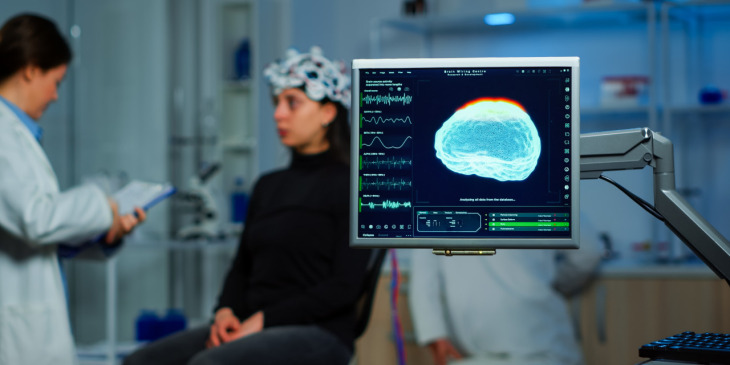
Chronic drug and alcohol use severely impacts the brain not just during the using episode – but for long after. Drugs impact how we feel and function and our ability to sustain recovery. When individuals stop using drugs, the brain doesn’t immediately recover. So, how long does it take to rewire your brain from addiction?
It can take time, which is why individuals are at increased risk of returning to use (relapse) in early recovery. In this blog, we address how addiction impacts the brain and essential bodily functions, how long it takes to rewire the brain from drug use, and things you can do to promote neuroplasticity.
How Do Drugs and Alcohol Impact the Brain?
To understand how drugs and alcohol impact the brain, it’s necessary to have a basic understanding of how the brain works. According to the National Institute on Drug Abuse (NIDA), the brain is a complex organ with billions of cells, called neurons, and interconnected networks and circuits.
These neurons control the flow of information, like a switch. When several neurons send a signal, they communicate with other neurons within a circuit. When these circuits work together as a team, they can perform certain tasks and functions in the body. And certain networks are responsible for coordinating different tasks and functions. For example, to send a message, a neuron releases neurotransmitters that travel to a receptor which can shut off the signaling between cells.
Drugs impact how neurons send and receive signals via neurotransmitters, causing abnormal messages throughout these networks. Drugs can cause neurons to release large amounts of neurotransmitters or prevent the recycling of these chemicals.
You may be wondering why you need to know this. There are several reasons. Drugs cause the following effects on the brain and body that are responsible for life-sustaining functions, in the following ways:
- Impacting motivation and pleasure by reactivating the circuits (the basal ganglia) responsible for pleasure by overreleasing the body’s natural opioids (endorphins) and stimulating the reward circuit (dopamine), making it difficult to experience pleasure from anything other than the drug, and motivating individuals to repeat the behavior to experience more pleasurable effects. Drugs also impact the ability to form and sustain habits and routines
- Withdrawal: drugs cause activation in the part of the brain (the extended amygdala) that causes feelings of anxiety and irritability when the drug wears off, otherwise known as withdrawal
- Executive function and impulse control: substances negatively impacting the ability to problem solve, make decisions, and control impulses (prefrontal cortex)
- Severe impairment of essential human functions: some drugs impact functions like breathing, regulating the heart, and sleeping, by interfering with the brain stem which controls these functions. Drugs like heroin can depress breathing and, in some cases, lead to death.
As drugs impact the release of pleasure and dampen the pleasurable effects of things individuals find enjoyable, like socializing and sex, it can cause individuals to seek out drugs to experience pleasure. Without drugs, this can lead to a person feeling flat or depressed.
Psychiatrist Dr. Richard Friedman explains this effect: “All rewards — sex, food, money, and drugs — cause a release of dopamine, which conveys a sense of pleasure and tells the brain something like: ‘This is an important experience. Don’t forget it!’” This is one of the reasons why a person using drugs will consistently seek them out, despite the negative consequences.
Unfortunately, even when a person gets sober, the reward circuit takes time to rewire after drug use. This is one of the major reasons why individuals in early recovery are prone to relapse.
What Happens to the Brain When a Person Gets Sober?
People who experience substance use disorder experience an impaired reward circuit (called dopamine receptors, or D2s). Friedman explains that in a study conducted by Dr Nora Volkow, the director of NIDA, she discovered that people addicted to drugs like alcohol, cocaine, heroin, and methamphetamines, experience a significant reduction in their reward circuit long after they stopped taking drugs.
Friedman explained that these individuals in early recovery “are far less sensitive to rewards, are less motivated and may find the world dull, once again making them prone to seek a chemical means to enhance their everyday life.” Volkow also found that low D2 receptors were linked to impairment of the ability to think critically and use self-control.
The brain is a remarkable organ, however, and is able to rewire itself. This is called neuroplasticity – a process that repairs damage caused to the brain and central nervous system and recovers to functional levels. This can happen in the context of recovering from a stroke, traumatic brain injury, and addiction (called addiction-related synaptic plasticity).
How Long Does it Take to Rewire Your Brain from Addiction?
There are several factors influencing a person’s substance use, such as the duration and intensity of drug use, the type of substance, and the damage caused, and it is impossible to have one standard timeline for the brain to rewire.
What is key, however, is for the person to find a pathway to recovery. That could be detox, a residential treatment program, an intensive outpatient program, medication-assisted treatment, or therapy. Whatever the pathway, it’s important the person has the means to find sobriety first and create a supportive environment to sustain that recovery. Additionally, there are several things that you can do to promote the brain’s rewiring process.
Scientists have discovered that certain activities can promote neuroplasticity:
- Exercise: found to promote improvements to the prefrontal cortex
- Counseling: cognitive behavioral therapy (CBT) has been shown to support neuroplasticity
- Medication-assisted treatment: MAT can support individuals to manage symptoms and access recovery strategies to maintain recovery
- Contingency management: providing rewards for sustaining recovery seeks to promote activating the reward circuit and reinforce recovery behaviors
If you or someone you love is experiencing a substance use disorder, help is available. Call
800-681-1058
(Sponsored)
today to learn about your treatment options.
